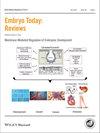Niels van Best, Mathias W. Hornef, Paul H. M. Savelkoul, John Penders
下载PDF
{"title":"On the origin of species: Factors shaping the establishment of infant's gut microbiota","authors":"Niels van Best, Mathias W. Hornef, Paul H. M. Savelkoul, John Penders","doi":"10.1002/bdrc.21113","DOIUrl":null,"url":null,"abstract":"<p>The human gut microbiota is a complex and dynamic ecosystem, which naturally lives in a symbiotic relationship with the host. Perturbations of the microbial composition (dysbiosis) and reduced diversity may promote disease susceptibility and recurrence. In contrast to the mature intestinal microbiota of healthy adults, which appears relatively stable over time, the infant's microbiome only establishes and matures during the first years of life. In this respect, early childhood seems to represent a crucial age-window in disease prevention, since microbial diversification and maturation of the microbiome primarily occurs during this period of life. A better understanding of ecological processes and pioneer consortia in microbial development is crucial, in order to support the development of a beneficial microbiota. Various deterministic and stochastic aspects seem to shape the microbiome in early life, including maternal, environmental, and host factors. Here, we review the current understanding of the origin of pioneer bacteria and the evolutionary factors that influence the development of the gut microbiota in infants. In addition, future perspectives, including manipulating and promoting the succession of initial bacteria during infancy, will be highlighted. Birth Defects Research (Part C) 105:240–251, 2015. © 2015 Wiley Periodicals, Inc.</p>","PeriodicalId":55352,"journal":{"name":"Birth Defects Research Part C-Embryo Today-Reviews","volume":"105 4","pages":"240-251"},"PeriodicalIF":0.0000,"publicationDate":"2015-11-26","publicationTypes":"Journal Article","fieldsOfStudy":null,"isOpenAccess":false,"openAccessPdf":"https://sci-hub-pdf.com/10.1002/bdrc.21113","citationCount":"72","resultStr":null,"platform":"Semanticscholar","paperid":null,"PeriodicalName":"Birth Defects Research Part C-Embryo Today-Reviews","FirstCategoryId":"1085","ListUrlMain":"https://onlinelibrary.wiley.com/doi/10.1002/bdrc.21113","RegionNum":0,"RegionCategory":null,"ArticlePicture":[],"TitleCN":null,"AbstractTextCN":null,"PMCID":null,"EPubDate":"","PubModel":"","JCR":"Q","JCRName":"Medicine","Score":null,"Total":0}
引用次数: 72
引用
批量引用
Abstract
The human gut microbiota is a complex and dynamic ecosystem, which naturally lives in a symbiotic relationship with the host. Perturbations of the microbial composition (dysbiosis) and reduced diversity may promote disease susceptibility and recurrence. In contrast to the mature intestinal microbiota of healthy adults, which appears relatively stable over time, the infant's microbiome only establishes and matures during the first years of life. In this respect, early childhood seems to represent a crucial age-window in disease prevention, since microbial diversification and maturation of the microbiome primarily occurs during this period of life. A better understanding of ecological processes and pioneer consortia in microbial development is crucial, in order to support the development of a beneficial microbiota. Various deterministic and stochastic aspects seem to shape the microbiome in early life, including maternal, environmental, and host factors. Here, we review the current understanding of the origin of pioneer bacteria and the evolutionary factors that influence the development of the gut microbiota in infants. In addition, future perspectives, including manipulating and promoting the succession of initial bacteria during infancy, will be highlighted. Birth Defects Research (Part C) 105:240–251, 2015. © 2015 Wiley Periodicals, Inc.
物种起源:影响婴儿肠道菌群形成的因素
人体肠道菌群是一个复杂而动态的生态系统,它与宿主自然存在共生关系。微生物组成的扰动(生态失调)和多样性的减少可能促进疾病的易感性和复发。健康成年人成熟的肠道微生物群随着时间的推移相对稳定,与之相反,婴儿的微生物群只在生命的头几年建立和成熟。在这方面,幼儿期似乎是预防疾病的关键年龄窗口,因为微生物的多样化和微生物组的成熟主要发生在生命的这一时期。为了支持有益微生物群的发展,更好地了解微生物发展的生态过程和先驱财团是至关重要的。各种确定性和随机因素似乎塑造了生命早期的微生物群,包括母亲、环境和宿主因素。在这里,我们回顾了目前对先锋细菌的起源和影响婴儿肠道微生物群发育的进化因素的理解。此外,未来的观点,包括在婴儿期操纵和促进初始细菌的继承,将被强调。出生缺陷研究(C辑)(5):344 - 344,2015。©2015 Wiley期刊公司
本文章由计算机程序翻译,如有差异,请以英文原文为准。

 求助内容:
求助内容: 应助结果提醒方式:
应助结果提醒方式:


